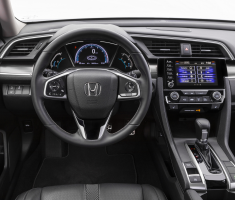— A Honda Civic class action lawsuit concerning air conditioner condensers has been dismissed as 2015-2019 Honda Civic owners claim the cars suffer from cracked air conditioning hoses and condensers.
The class action lawsuit alleges refrigerant leaks and prevents the air conditioners from working properly.
According to the plaintiffs who sued, the Honda Civic air conditioning systems aren't strong enough to handle the internal pressures and outside forces the systems encounter when driving.
The Honda Civic class action lawsuit alleges the automaker knew about the alleged air conditioner problems before the vehicles were sold. But Honda allegedly concealed the alleged air conditioning defects from all 2015-2019 Civic owners.
When the Civic air conditioning systems fail within the warranty period, the plaintiffs claim “Honda often shirks its warranty obligations” by requiring diagnostic fees before any repairs can be performed.
Dealerships also allegedly deny air conditioner warranty coverage by saying the systems show “signs of impact from road debris."
The Honda class action references an August 2019 air conditioner condenser extended warranty for 2016-2018 Civics.
"American Honda is extending the warranty on the A/C condenser to 10 years from the original date of purchase with unlimited miles. This warranty only covers vehicles that have a defective A/C condenser from the factory. The A/C condenser was not manufactured to specification. As a result, tiny holes may develop in the condenser tube walls that allows the refrigerant to leak out." — Honda Service Bulletin 19-091
In addition to extended warranty coverage, the program also provides for reimbursement of repair costs for Civic owners who paid to have the air conditioner condensers replaced because of the defect Honda identifies. Nothing about the program involves a leaking air conditioner condenser due to "foreign object damage."
And although Honda created a warranty extension program, the plaintiffs allege the warranty extension program is useless because it “covers only replacement of AC System condensers that failed due to an alleged manufacturing defect that Honda claims causes condensers to develop pinhole leaks due to corrosion."
According to the Honda Civic class action lawsuit, the extended warranty program doesn't cover all the work needed to repair the air conditioning systems.
Honda Civic Class Action Lawsuit Is Dismissed
In dismissing the lawsuit, Judge Josephine L. Staton found problems with allegations and claims concerning Honda's warranties.
The plaintiffs admit that at the time the first amended lawsuit was filed, “[they] ha[d] yet to receive from Honda any communications informing them of the [warranty extension] program’s existence or its parameters.”
And yet, the plaintiffs claim Honda’s warranty extension program “does not provide the full relief to which the Class is entitled.”
"In that vein, Plaintiffs somehow claim to have enough information to conclude that Honda’s warranty extension is ineffectual because 'the AC System Defect can manifest years after authorized dealers effect repairs, [and therefore] many Class Members may experience additional AC System failures more than ten years after purchase'—i.e., outside the warranty extension period." — Judge Stanton
The judge says a court must take allegations at face value, but only if the allegations are plausible. According to the judge, "none of the named Plaintiffs’ alleged experiences show, even remotely, that the claimed defect 'can manifest years after authorized dealers effect repairs.'”
And while the plaintiffs claim “the warranty extension program will not compensate Class Members for either the diminution in value of their Vehicles, or the amount by which they overpaid for [their] vehicles," the judge ruled the plaintiffs fail to take into account the value, if any, of the extended warranty program, which is unknown.
According to Judge Staton, the plaintiffs are asking her to "deal in hypotheticals" over claims the plaintiffs make about the Honda air conditioner warranty program.
Less than a month after Honda announced the warranty extension, the plaintiffs filed their first amended complaint by claiming a warranty program they hadn't taken advantage of “fails to make Class Members whole."
"In other words, Plaintiffs take issue with Honda’s response to an alleged defect, but they rushed to file their amended complaint before Honda’s response could play out, asking the Court to deal in hypotheticals." — Judge Stanton
The judge also pointed out the air conditioning systems were working properly for all but two of the plaintiffs after Honda made repairs at the time the second amended class action lawsuit was filed.
And only one plaintiff has filed for reimbursement for out-of-pocket expenses under Honda’s warranty extension program.
While the plaintiffs allege Honda's AC repairs “restore functionality only temporarily,” the judge found only three of the plaintiffs experienced more than one air conditioner failure, and for two plaintiffs the repeated failures happened in close succession over a short period of time.
"The Court therefore finds that Plaintiffs have not plausibly alleged that Honda’s AC system repairs 'restore functionality only temporarily' across the board such that 'a ‘credible threat’ that a probabilistic harm will materialize' is present."
According to the judge, this leaves none of the plaintiffs with standing to pursue claims for injunctive relief.
And according to the judge, this time the plaintiffs can't amend their lawsuit.
"Here, the Court concludes that the facts require development, not that Plaintiffs possess additional facts they could have pleaded to render their claims ripe for adjudication but did not. On this record, therefore, the Court concludes that granting leave to amend would be imprudent. Accordingly, the Court DENIES leave to amend." — Judge Stanton
The case is Elkins et al. v. American Honda Motor Co., Inc., et al., filed in U.S. District Court for the Central District of California.

